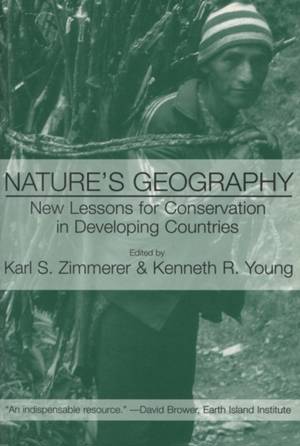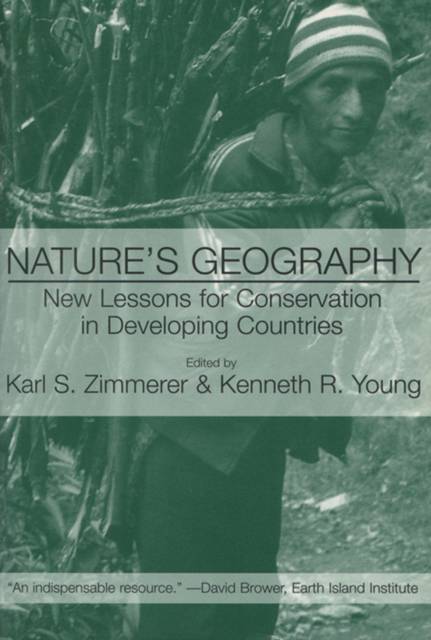
Je cadeautjes zeker op tijd in huis hebben voor de feestdagen? Kom langs in onze winkels en vind het perfecte geschenk!
- Afhalen na 1 uur in een winkel met voorraad
- Gratis thuislevering in België vanaf € 30
- Ruim aanbod met 7 miljoen producten
Je cadeautjes zeker op tijd in huis hebben voor de feestdagen? Kom langs in onze winkels en vind het perfecte geschenk!
- Afhalen na 1 uur in een winkel met voorraad
- Gratis thuislevering in België vanaf € 30
- Ruim aanbod met 7 miljoen producten
Zoeken
Nature's Geography
New Lessons for Conservation in Developing Countries
Karl S Zimmerer
Paperback | Engels
€ 42,95
+ 85 punten
Omschrijving
Developing countries in Africa, Asia, and Latin America are increasingly influenced by human-induced environmental changes. It is crucial that sustainable development be based on insights into these expanding processes--conservation as well as deterioration. Nature's Geography offers a new perspective on the geographical nature of these changes. The book reveals how human-environment relations must be understood at multiple scales and time frames.
Editors Karl S. Zimmerer and Kenneth R. Young have forged an exciting group of case studies from distinguished geographers focusing on high mountains, tropical forests, and lowlands, as well as humid and arid-semiarid landscapes. Each chapter analyzes the implications for meshing environmental protection and sound resource use with development.
The case studies evaluate three topics: spatial habitat fragmentation and forest dynamics; disturbances in mountain ecosystems; and the major activities of settled areas, chiefly farming, livestock-raising, and forestry. Included are analyses of interactions involving wildlife, such as primates and wild pandas; assessment of fire impacts and road-building; long-term forest management as well as recent techniques; and the role of environmental variation and ecosystem properties in agriculture and rangeland.
Nature's Geography demonstrates the vital importance of advancing a new approach to geography. This definitive study of landscape change and environmental dynamics will have wide appeal for those interested in geography, ecology, environmental studies, conservation biology, and development studies.
Editors Karl S. Zimmerer and Kenneth R. Young have forged an exciting group of case studies from distinguished geographers focusing on high mountains, tropical forests, and lowlands, as well as humid and arid-semiarid landscapes. Each chapter analyzes the implications for meshing environmental protection and sound resource use with development.
The case studies evaluate three topics: spatial habitat fragmentation and forest dynamics; disturbances in mountain ecosystems; and the major activities of settled areas, chiefly farming, livestock-raising, and forestry. Included are analyses of interactions involving wildlife, such as primates and wild pandas; assessment of fire impacts and road-building; long-term forest management as well as recent techniques; and the role of environmental variation and ecosystem properties in agriculture and rangeland.
Nature's Geography demonstrates the vital importance of advancing a new approach to geography. This definitive study of landscape change and environmental dynamics will have wide appeal for those interested in geography, ecology, environmental studies, conservation biology, and development studies.
Specificaties
Betrokkenen
- Auteur(s):
- Uitgeverij:
Inhoud
- Aantal bladzijden:
- 272
- Taal:
- Engels
Eigenschappen
- Productcode (EAN):
- 9780299159146
- Verschijningsdatum:
- 25/03/2003
- Uitvoering:
- Paperback
- Formaat:
- Trade paperback (VS)
- Afmetingen:
- 156 mm x 227 mm
- Gewicht:
- 503 g

Alleen bij Standaard Boekhandel
+ 85 punten op je klantenkaart van Standaard Boekhandel
Beoordelingen
We publiceren alleen reviews die voldoen aan de voorwaarden voor reviews. Bekijk onze voorwaarden voor reviews.









